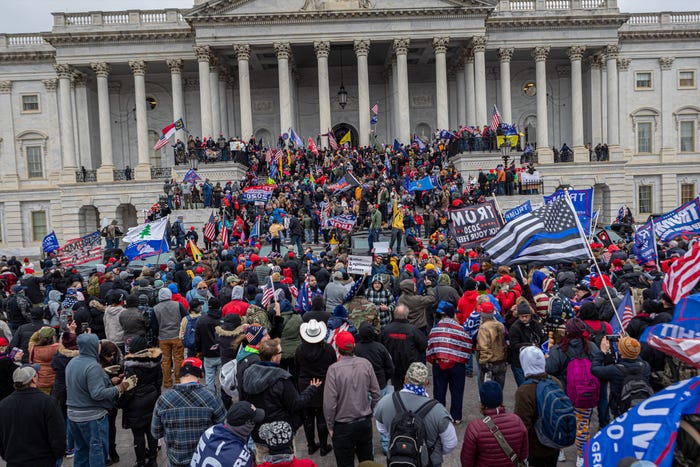When Donald Trump entered the White House as the 45th President of the United States of America on January 20th, in 2017, the influential Washington Post newspaper commented on the event with one big headline: “Democracy Dies in Darkness” and adopted it as its slogan.
This fateful phrase, which seems to have been taken from a Shakespeare tragedy, seemed to hover gloomily over the Capitol Hill in the terrible hours of the armed assault of Donald Trump’s followers.
A real trauma for a country that appears split in two between the liberal democratic soul represented by the Democrats and the reactionary soul embodied by the Republicans.
The assault on the Capitol Hill seems to make concrete the hypothesis, cited by many American commentators, of the revival of the Civil War that bedeviled the country one hundred and fifty years ago, pitting the North of liberal Abraham Lincoln against the South of the confederate slaveholders.
After the demonstrations of the Black Lives Matter movement, which also called the country’s history into question, targeting the statues of slave politicians, the armed assault conducted by Trumpist groups at the heart of federal democracy, showed the world a divided country in two opposing entities, ready for direct confrontation.
But perhaps the most powerful and destructive effect of the images released by the American networks from Washington has been international.
“Right now, dictators from all over the world are sitting in front of the television with popcorn enjoying the show of the largest democracy in the world devastated worse than the Latin American regimes”, commented on a live TV Paolo Magri, who directs the Italian Institute of Foreign Policy ISPI.
And the concern, about the effect that those images could have on the prestige of liberal democracies around the world, must have been great if the news agencies immediately began to write the worried statements of all Western political leaders.
The mechanisms and the system of values of European democracies are in crisis everywhere due to the end of economic expansion and development, migration policies and the advance of populist movements, cleared and supported by Donald Trump in these years of presidency.
The slogan “America first” launched by the White House has translated in Hungaria into the theory of illiberal democracy of Viktor Orban, of Polish, Czech and Austrian populisms, in the electoral advance of the German right.
A rising political front that corrodes the liberal principles on which the European Union and the continent’s democracies are founded.
The assault on the US parliament dealt a severe hit to the international role of the United States as a model of reference for the new democracies.
Let’s think of the role played by Bill Clinton in the end of the war in the Balkans, the persecution of the Albanians in the former Yugoslavia and in the birth of Kosovo.
Many countries look to the US as a model to follow in the consolidation of their institutions and social life.
The US State Department publishes a Human Rights Report every year that serves as a reference point for international politics.
US embassies around the world encourage governments to fight organized crime and corruption, to align their laws with those of international democratic legislation.
Will Washington have the same international credibility after what happened at the Capitol?
The clash between the model of liberal democracy and that of Putin’s “democracy” or the communist capitalism of Beijing sees the US certainly weakened by Trump’s “coup”.
For this reason, in the pivotal hours of the assault, the new president Joe Biden rushed to declare that “This you are seeing is not the real America”.
The problem is precisely that America is also this: a charmless, hateful, violent, perhaps desperate and certainly disturbing America that has so far been hidden by the films, songs and beautiful images of Hollywood and Manhattan’s intellectual elites.
An America from the suburbs that today wants to take power with a gun in hands.
Will Biden be able to mend ties and reconstitute a united and supportive society in a country founded on individualism?
And we, peoples of the democracies “work in progress”, will we be able to continue along the path we have taken when the model we were referring to, seems to be in more critical conditions than ours?
Author
-

Researcher on International Relations Middle East and Balkans
View all posts
CSSII- Centro Interdipartimentale di Studi Strategici, Internazionali e Imprenditoriali,
Università di Firenze, Italy, Albania




